外研版(2019) 必修第一册 Unit 6 At one with nature Using language(共23张PPT)
文档属性
| 名称 | 外研版(2019) 必修第一册 Unit 6 At one with nature Using language(共23张PPT) |

|
|
| 格式 | zip | ||
| 文件大小 | 1.8MB | ||
| 资源类型 | 教案 | ||
| 版本资源 | 外研版(2019) | ||
| 科目 | 英语 | ||
| 更新时间 | 2022-08-03 00:00:00 | ||
图片预览

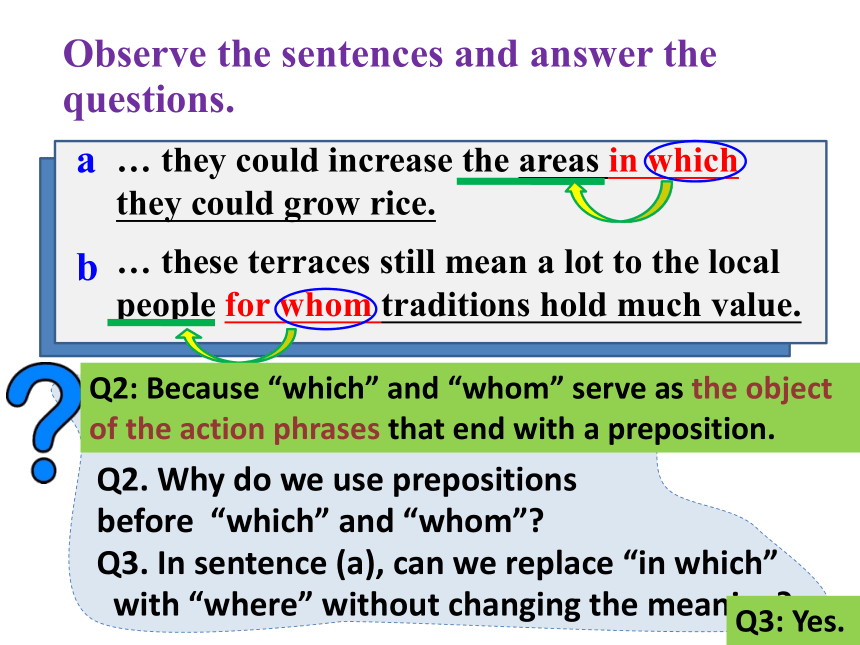
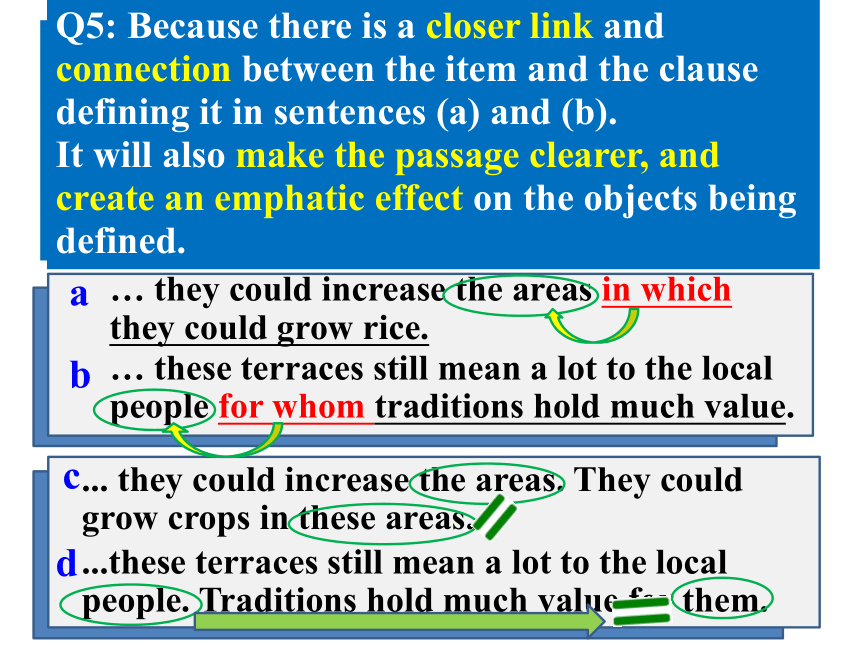
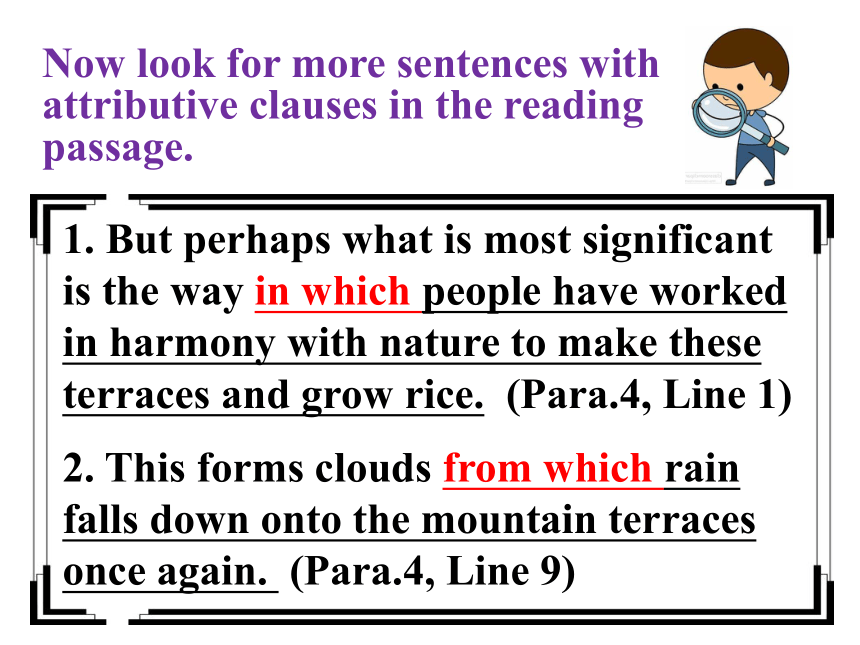
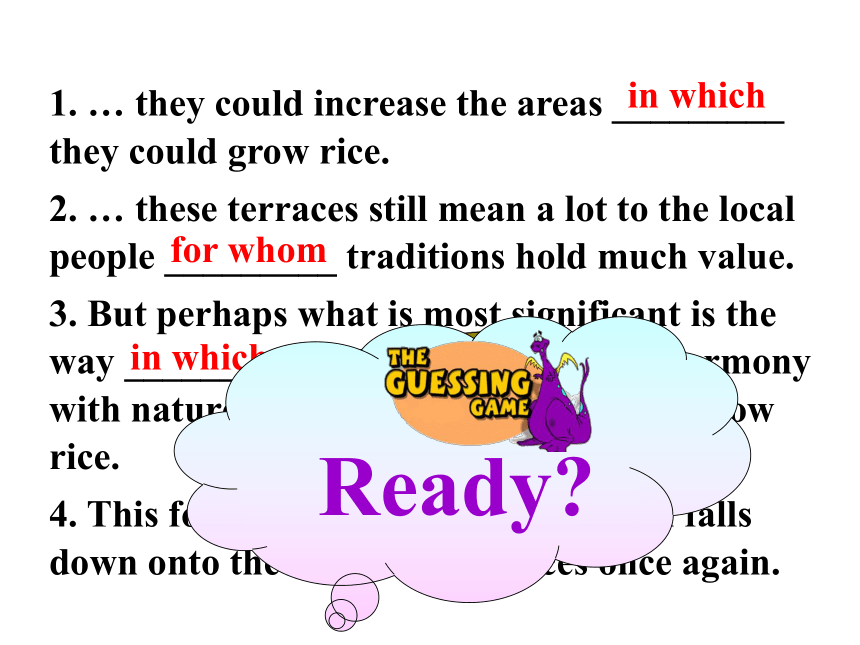
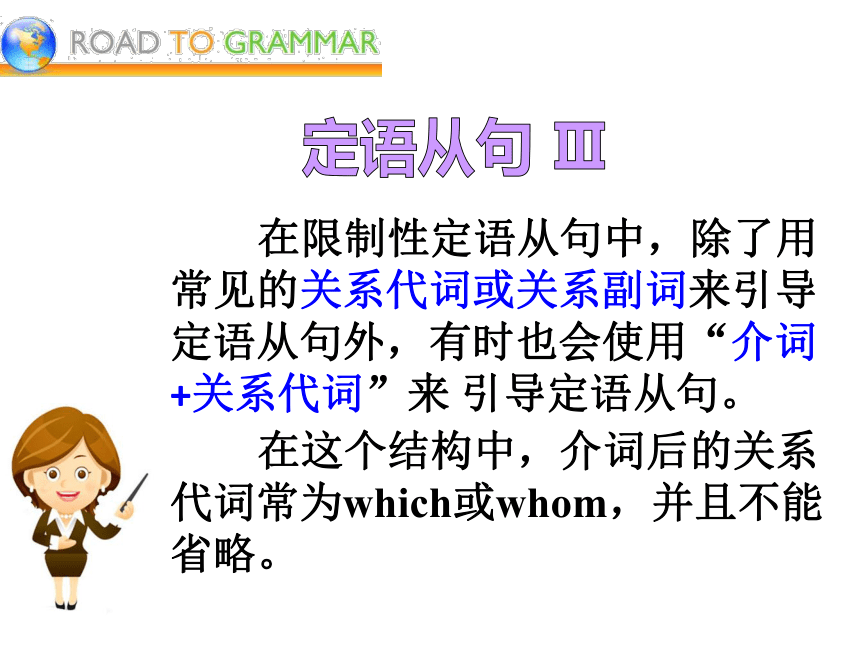
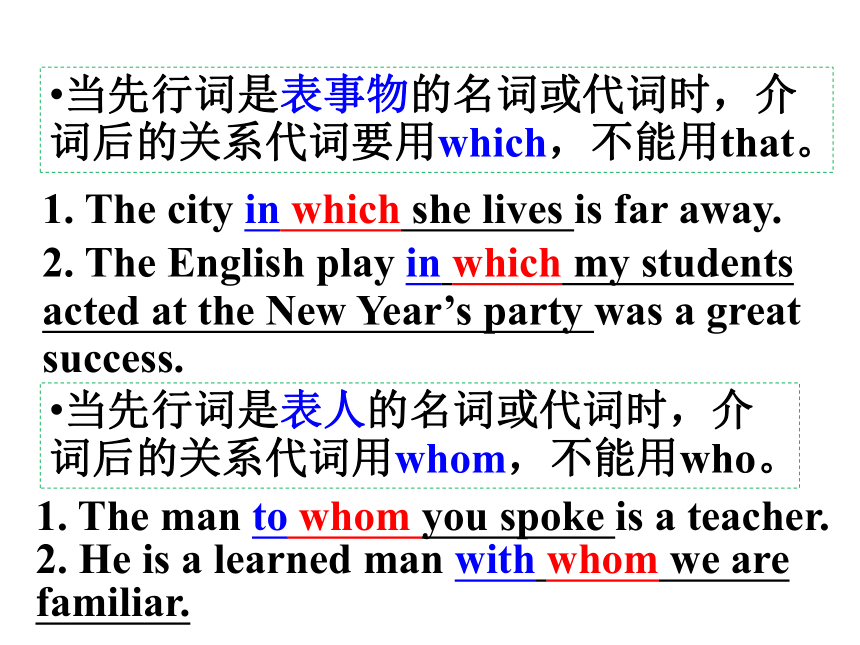
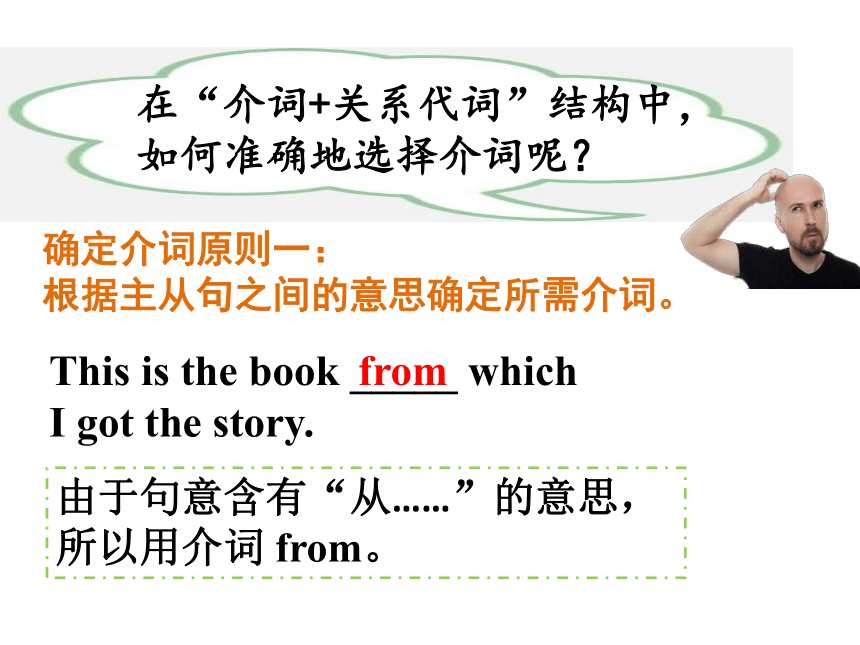
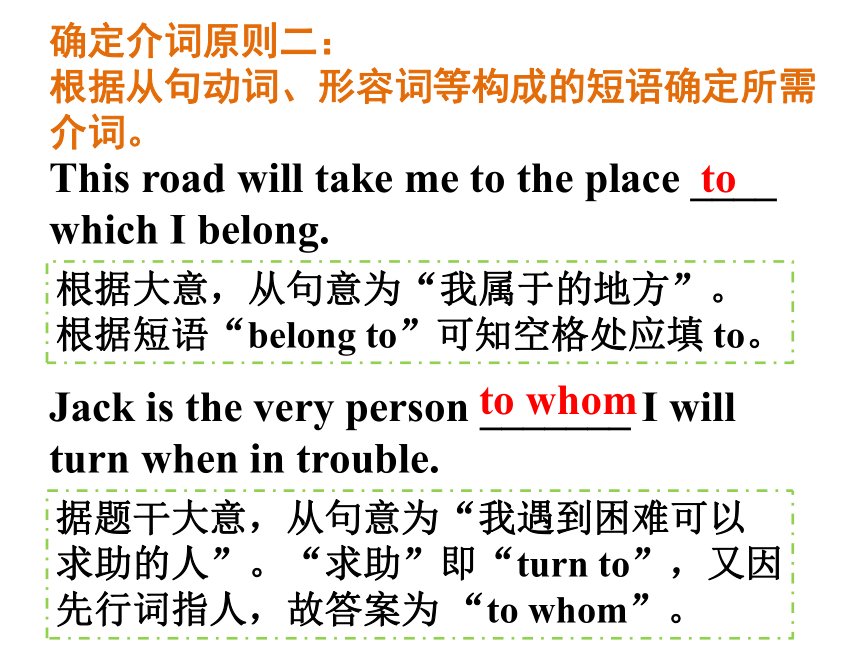
文档简介
(共23张PPT)
Using language
… they could increase the areas in which they could grow rice.
… these terraces still mean a lot to the local people for whom traditions hold much value.
a
b
Observe the sentences and answer the questions.
Q1. What do “which” and “whom”
refer to in each sentence
Q2. Why do we use prepositions
before “which” and “whom”
Q3. In sentence (a), can we replace “in which”
with “where” without changing the meaning
Q2: Because “which” and “whom” serve as the object of the action phrases that end with a preposition.
Q3: Yes.
… they could increase the areas in which they could grow rice.
… these terraces still mean a lot to the local people for whom traditions hold much value.
a
b
... they could increase the areas. They could grow crops in these areas.
...these terraces still mean a lot to the local people. Traditions hold much value for them.
c
d
Compare and answer the questions.
4. What is the difference between the two groups of sentences
5. Why does the author choose to use sentences (a) and (b) in the reading passage
Q4: Sentences (a) and (b) both contain a clause defining a noun in the sentence.
Sentence (c) and (d) are constructed with a pair of simple sentences, with one defining a noun in the other sentence in each pair.
Q5: Because there is a closer link and connection between the item and the clause defining it in sentences (a) and (b).
It will also make the passage clearer, and create an emphatic effect on the objects being defined.
Now look for more sentences with attributive clauses in the reading passage.
2. This forms clouds from which rain falls down onto the mountain terraces once again. (Para.4, Line 9)
1. But perhaps what is most significant is the way in which people have worked in harmony with nature to make these terraces and grow rice. (Para.4, Line 1)
1. … they could increase the areas _________ they could grow rice.
2. … these terraces still mean a lot to the local people _________ traditions hold much value.
3. But perhaps what is most significant is the way ________ people have worked in harmony with nature to make these terraces and grow rice.
4. This forms clouds ___________ rain falls down onto the mountain terraces once again.
for whom
in which
in which
from which
go
Ready
定语从句 Ⅲ
在限制性定语从句中,除了用常见的关系代词或关系副词来引导定语从句外,有时也会使用“介词+关系代词”来 引导定语从句。
在这个结构中,介词后的关系代词常为which或whom,并且不能省略。
1. The man to whom you spoke is a teacher.
2. He is a learned man with whom we are familiar.
当先行词是表人的名词或代词时,介词后的关系代词用whom,不能用who。
1. The city in which she lives is far away.
2. The English play in which my students acted at the New Year’s party was a great success.
当先行词是表事物的名词或代词时,介词后的关系代词要用which,不能用that。
在“介词+关系代词”结构中,如何准确地选择介词呢?
This is the book _____ which
I got the story.
由于句意含有“从……”的意思,所以用介词 from。
from
确定介词原则一:
根据主从句之间的意思确定所需介词。
This road will take me to the place ____ which I belong.
根据大意,从句意为“我属于的地方”。根据短语“belong to”可知空格处应填 to。
to
确定介词原则二:
根据从句动词、形容词等构成的短语确定所需介词。
Jack is the very person _______ I will turn when in trouble.
据题干大意,从句意为“我遇到困难可以求助的人”。“求助”即“turn to”,又因先行词指人,故答案为 “to whom”。
to whom
The song often takes me back to the day when the accident happened.
The song often takes me back to the day _____ which the accident happened.
据第一句可知,第二句中which用来指先行词“the day”,在从句中意为“在这天”,故填介词“on”。
确定介词原则三:
根据先行词确定所需介词。
on
此时“介词+关系代词”结构往往
可以和关系副词互换。如:
when=表时间的介词(in, at, during等)+which
where =表地点的介词(in, at, on, under等) +which;
why=表原因的介词 for+ which
1. I met the child (whom) I looked after ten years ago.
我遇到了十年前我照料过的那个孩子。
2. This is the pen (that/which) you are looking for.
这是你正在找的钢笔。
含有介词的动词固定短语在定语从句中一般不拆开,在这种情况下,介词仍然放在后面,如 hear from,look after, look for等。而在介词处于句尾时,句中的关系代词可以省略。
注意:
Exercise
1. I still remember the day ___ I came here.
A. on which B. that
C. when D. at which
2. This is the house ____ I lived last year.
A. that B. where
B. in which D. at which
多选。
The morning in which my dog got lost
was in my mind forever.
改错。
解析:在具体某天的早上、下午等时刻前的介词应用on,即on the morning.
on
Connect the sentences with a preposition + whom/which.
2
1. The Zhuang is an ethnic group.
Its population is the largest of all ethnic groups in China.
2. Guangxi is a province. The Longji Rice Terraces are located in it.
The Zhuang is an ethnic group of which the population is the largest of all ethnic groups in China.
Guangxi is a province in which the Longji Rice Terraces are located.
Exercise
P65
3. I want to visit this cultural landscape. The title of UNESCO World Heritage Site was given to it in 2016.
4. He is an expert on rice planting. The local Zhuang people have learnt a lot from him.
I want to visit this cultural landscape to which the title of UNESCO World Heritage Site was given in 2016.
He is an expert on rice planting from whom the local Zhuang people have learnt a lot.
P65
Complete the passage with a preposition +whom/which.
3
from which
in which
for which
for whom
P65
“介词+关系代词”引导的定语从句
介词的确定:
1. 由主从句的句意决定;
2. 由从句动词、形容词等构成的固定短语确定;
3.根据先行词确定所需介词。
结构:
介词+which(指物)/介词+whom(指人)
实战高考
He likes that he can sit and check his phone in peace or chat up the barkeeper ____ _______ he’s on a first-name basis if he wants to have a little interaction. [2019 课标全国卷Ⅰ阅读理解 C篇]
with whom
他喜欢能坐着安静地看手机,或者如果他想和别人有点交流的话,就和他能直呼其名的服务生聊上几句。
1. 根据句意填空。
实战高考
2. Some experts think reading is the
fundamental skill upon ______ school
education depends. [2015安徽]
3. Creating an atmosphere _______ employees feel part of a team is a big challenge. [2015·浙江]
A. as B. whose
C. in which D. at which
which
1. Do you like the book _____ ______ she learned a lot
2. The tower ____ _______ people can have a good view is on the hill.
3. The man ____ ______ you are going to make
friends is my father’s neighbor.
4. Do you know the reason _____ ______ he
got angry
5. — Can you believe I had to pay 30 dollars
for a haircut
— You should try the barber’s ___ ______ I go. It’s only 15.
根据句意用“介词+关系代词”结构填空。
about which
from which
with whom
for which
to which
翻译句子。
1. 刚才和你谈话的那个男孩是个电脑游戏高手。
2. 他们找寻的文件已经找到了。
3.历史是我们学校每个学生都很感兴趣的课程。
The boy to whom you talked just now is a master of computer games.
The documents for which they were searching have been recovered.
History is the subject in our school in which every student is interested.
Self-evaluation
Can you use the Attributive Clauses (preposition +which/whom) correctly
1. Try to use Attributive Clauses to describe the people or things around you. (50 words)
Topics:1) My best friend
2) Our school
3)My favorite teacher
2. Finish the Exercises of the
Grammar part in Learning
English.
Using language
… they could increase the areas in which they could grow rice.
… these terraces still mean a lot to the local people for whom traditions hold much value.
a
b
Observe the sentences and answer the questions.
Q1. What do “which” and “whom”
refer to in each sentence
Q2. Why do we use prepositions
before “which” and “whom”
Q3. In sentence (a), can we replace “in which”
with “where” without changing the meaning
Q2: Because “which” and “whom” serve as the object of the action phrases that end with a preposition.
Q3: Yes.
… they could increase the areas in which they could grow rice.
… these terraces still mean a lot to the local people for whom traditions hold much value.
a
b
... they could increase the areas. They could grow crops in these areas.
...these terraces still mean a lot to the local people. Traditions hold much value for them.
c
d
Compare and answer the questions.
4. What is the difference between the two groups of sentences
5. Why does the author choose to use sentences (a) and (b) in the reading passage
Q4: Sentences (a) and (b) both contain a clause defining a noun in the sentence.
Sentence (c) and (d) are constructed with a pair of simple sentences, with one defining a noun in the other sentence in each pair.
Q5: Because there is a closer link and connection between the item and the clause defining it in sentences (a) and (b).
It will also make the passage clearer, and create an emphatic effect on the objects being defined.
Now look for more sentences with attributive clauses in the reading passage.
2. This forms clouds from which rain falls down onto the mountain terraces once again. (Para.4, Line 9)
1. But perhaps what is most significant is the way in which people have worked in harmony with nature to make these terraces and grow rice. (Para.4, Line 1)
1. … they could increase the areas _________ they could grow rice.
2. … these terraces still mean a lot to the local people _________ traditions hold much value.
3. But perhaps what is most significant is the way ________ people have worked in harmony with nature to make these terraces and grow rice.
4. This forms clouds ___________ rain falls down onto the mountain terraces once again.
for whom
in which
in which
from which
go
Ready
定语从句 Ⅲ
在限制性定语从句中,除了用常见的关系代词或关系副词来引导定语从句外,有时也会使用“介词+关系代词”来 引导定语从句。
在这个结构中,介词后的关系代词常为which或whom,并且不能省略。
1. The man to whom you spoke is a teacher.
2. He is a learned man with whom we are familiar.
当先行词是表人的名词或代词时,介词后的关系代词用whom,不能用who。
1. The city in which she lives is far away.
2. The English play in which my students acted at the New Year’s party was a great success.
当先行词是表事物的名词或代词时,介词后的关系代词要用which,不能用that。
在“介词+关系代词”结构中,如何准确地选择介词呢?
This is the book _____ which
I got the story.
由于句意含有“从……”的意思,所以用介词 from。
from
确定介词原则一:
根据主从句之间的意思确定所需介词。
This road will take me to the place ____ which I belong.
根据大意,从句意为“我属于的地方”。根据短语“belong to”可知空格处应填 to。
to
确定介词原则二:
根据从句动词、形容词等构成的短语确定所需介词。
Jack is the very person _______ I will turn when in trouble.
据题干大意,从句意为“我遇到困难可以求助的人”。“求助”即“turn to”,又因先行词指人,故答案为 “to whom”。
to whom
The song often takes me back to the day when the accident happened.
The song often takes me back to the day _____ which the accident happened.
据第一句可知,第二句中which用来指先行词“the day”,在从句中意为“在这天”,故填介词“on”。
确定介词原则三:
根据先行词确定所需介词。
on
此时“介词+关系代词”结构往往
可以和关系副词互换。如:
when=表时间的介词(in, at, during等)+which
where =表地点的介词(in, at, on, under等) +which;
why=表原因的介词 for+ which
1. I met the child (whom) I looked after ten years ago.
我遇到了十年前我照料过的那个孩子。
2. This is the pen (that/which) you are looking for.
这是你正在找的钢笔。
含有介词的动词固定短语在定语从句中一般不拆开,在这种情况下,介词仍然放在后面,如 hear from,look after, look for等。而在介词处于句尾时,句中的关系代词可以省略。
注意:
Exercise
1. I still remember the day ___ I came here.
A. on which B. that
C. when D. at which
2. This is the house ____ I lived last year.
A. that B. where
B. in which D. at which
多选。
The morning in which my dog got lost
was in my mind forever.
改错。
解析:在具体某天的早上、下午等时刻前的介词应用on,即on the morning.
on
Connect the sentences with a preposition + whom/which.
2
1. The Zhuang is an ethnic group.
Its population is the largest of all ethnic groups in China.
2. Guangxi is a province. The Longji Rice Terraces are located in it.
The Zhuang is an ethnic group of which the population is the largest of all ethnic groups in China.
Guangxi is a province in which the Longji Rice Terraces are located.
Exercise
P65
3. I want to visit this cultural landscape. The title of UNESCO World Heritage Site was given to it in 2016.
4. He is an expert on rice planting. The local Zhuang people have learnt a lot from him.
I want to visit this cultural landscape to which the title of UNESCO World Heritage Site was given in 2016.
He is an expert on rice planting from whom the local Zhuang people have learnt a lot.
P65
Complete the passage with a preposition +whom/which.
3
from which
in which
for which
for whom
P65
“介词+关系代词”引导的定语从句
介词的确定:
1. 由主从句的句意决定;
2. 由从句动词、形容词等构成的固定短语确定;
3.根据先行词确定所需介词。
结构:
介词+which(指物)/介词+whom(指人)
实战高考
He likes that he can sit and check his phone in peace or chat up the barkeeper ____ _______ he’s on a first-name basis if he wants to have a little interaction. [2019 课标全国卷Ⅰ阅读理解 C篇]
with whom
他喜欢能坐着安静地看手机,或者如果他想和别人有点交流的话,就和他能直呼其名的服务生聊上几句。
1. 根据句意填空。
实战高考
2. Some experts think reading is the
fundamental skill upon ______ school
education depends. [2015安徽]
3. Creating an atmosphere _______ employees feel part of a team is a big challenge. [2015·浙江]
A. as B. whose
C. in which D. at which
which
1. Do you like the book _____ ______ she learned a lot
2. The tower ____ _______ people can have a good view is on the hill.
3. The man ____ ______ you are going to make
friends is my father’s neighbor.
4. Do you know the reason _____ ______ he
got angry
5. — Can you believe I had to pay 30 dollars
for a haircut
— You should try the barber’s ___ ______ I go. It’s only 15.
根据句意用“介词+关系代词”结构填空。
about which
from which
with whom
for which
to which
翻译句子。
1. 刚才和你谈话的那个男孩是个电脑游戏高手。
2. 他们找寻的文件已经找到了。
3.历史是我们学校每个学生都很感兴趣的课程。
The boy to whom you talked just now is a master of computer games.
The documents for which they were searching have been recovered.
History is the subject in our school in which every student is interested.
Self-evaluation
Can you use the Attributive Clauses (preposition +which/whom) correctly
1. Try to use Attributive Clauses to describe the people or things around you. (50 words)
Topics:1) My best friend
2) Our school
3)My favorite teacher
2. Finish the Exercises of the
Grammar part in Learning
English.
